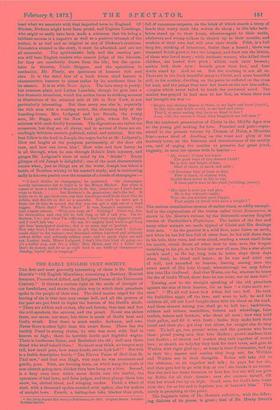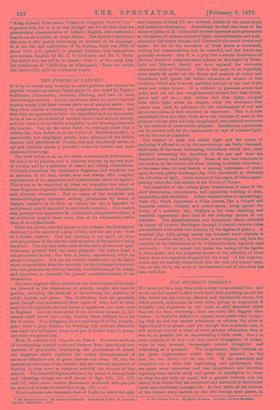THE EARLY ENGLISH TEXT SOCIETY.
THE first and most generally interesting of these is Dr. Richard Morris's "Old English Miscellany, containing a Bestiary, Kentish Sermons, Proverbs of Alfred, and Religious Poems of the Thirteenth Century." It throws a curious light on the mode of thought of our forefathers, and shows the plain way in which their preachers spoke to the people of their sins. The chief motive urged for the leaving of sin is that men may escape hell, and all the powers of the poet are put forth to depict the horrors of the Devil's abode. "There are adders and snakes, efts and ferrets, that tear and fret the evil-speakers, the envious, and the proud. Never sun shines there, nor moon, nor stars, but there is much of God's heat and God's wrath. Ever there is much smoke, darkness, and awe. Never there is other light than the swart flame. There lies the loathly Fiend in strong chains, he who was once with God in heaven so high ; there lie horrible devils and frightful wights. There is loathsome Satan, and Beelzebub the old ; well may those dread who shall behold them! No heart may think, no tongue may tell, how much pain, how many fiends, are in dark hell!" But this is a feeble description beside "The Eleven Pains of Hell that St. Paul saw," and that one Hugh, who says he was courteous and gentle, pens. First, are burning trees, on which hang the souls of non-church-going men, thicker than bees hang on a hive. Second, is a fiery oven into which seven devils cast the lustful, the nprearers of bad laws, and false judges, and then plunge them into snow, ice, clotted blood, and stinging snakes. Third, a wheel of steel, with a thousand spokes covered with spikes, also for makers of unright laws. Fourth, a boiling-hot lake, blacker than pitch,
• The Early English Text Eoeiety's Publications for 1872. Original Series. London: Trtibuer and Co. full of venomous serpents, on the brink of which stands a troop of fiends that worry souls like wolves do sheep ; in this lake back- biters stand up to their knees, whoremongers to their necks, adulterers and wrong-talkers in church up to their mouths, and workers of their own bad will over their heads. Fifth, is a full- deep fen, stinking of brimstone, fouler than a hound ; there tea- thousand fiends gnaw in two the tongues, and draw out the brains, of these who loved usury ; while unchaste women, who killed their children, are basted with pitch ; adders suck their breasts ; snakes lock their eyes ; hounds gnaw their feet, and four devils stand by. And so on. But the teaching is not all so: There are in the book beautiful songs to Christ, and more beautiful still, to his mother, dwelling on the pains he suffered on the cross for man, and the pangs that rent her heart as she saw him suffer,, —topics which never failed to touch the medimval mind. The
mother was prayed to lead men to her Son, on whom their sins had brought his woe
Bright and shining Queen of Stars, so me light and leers [teachl,. In this false and fickle world, so me lead and steer, That I, at mine ending day, have no fiend to fear ! Jesu, with thy sweetest blood, thou boughtest me full dear !"
But the tenderest presentation of Christ in the Middle Ages was. to the young girl seeking for love. Preacher and poet—repre- sented in the present volume by Thomas of Hales, a Minorite friar—never tired of dwelling on the trust and glory of the heavenly lover, on the falseness and trausitoriness of the earthly one, and of urging the maiden to preserve her great jewel,.
virginity, to meet her spouse with in heaven :—
" Ah, sweet ! if thou but knew
The good ways of this dearest Child !
He is fair, and bright of hue,
Glad of cheer, so meek and mild ; "Of lovesome lust, of trust so true, Free of heart, of wisdom wild, Needst then never in life to rue, If thou past thee in his yield [wielding, power]._ "His sight is ever joy and glee, He is day withoute night ; Wore sho not maiden most happio, That might ay dwell with such a knight ? "
The curious moralization-system of earlier times. so oddly exetnpli- fled in the explanations of the stories called Gesta Romanorum, is shown in Dr. Morris's volume by the thirteenth-century English' version of Thetbaldier's Physiologus. The habits of the lion and many other animals are made typical of Christ and His dealings- with men. "As the panther is a wild deer, none fairer on earth,.
and when he has fed him full of other deer, he lies still three days in his hole, then rises, and cries aloud, sending a sweet smell from. his mouth, which draws all other deer to him, save the dragon.
trembling in his pit, so is Christ fair over all men, like a star above earth's mud ; so He lay long here in holes, slept three days when dead, in blood and bones ; so he rose and cried out. of hell, and ascended to heaven, leaving among men the sweet smell of His holy Gospel, wherethrough we may follow him into His Godhead. And that Worm, our foe, whereso he hears the din of God's Word, there dare he not come, nor no man hurt.'
Turning now to the straight speaking of the old preachers against the sins of their hearers, let us hear "a little sooth ser- mon." " We all well know how Adam fell into hell. He took. the forbidden apple off the tree, and went to hell, he and his: children all, till our Lord bought them with his blood on the road.. And these sinners among you shall go to hell too ; backbiters, robbers and reivers, mankillers, lechers and whorelinga, false traders, bakers and brewers, who cheat all men ; how they hold their gallon, and fill it with froth ; feeble they make both their bread and their ale ; get they but silver, for naught else do they care. To hell go, too, priests' wives, and the parsons who have- them ; proud young men that love Malkin ; proud maidens that. love Jankiu ; at church and market they talk together of secret love ; at church on holyday they look for their loves, and gaze at. Watkin with right glad eye ; at home is their Paternoster, tied up. in their tie ; masses and matins they keep not, for Willikin.
and Watkin are in their thoughts. Robin will take Jill to the alehouse, to sit together and talk ; he pays for her ale, and then gets her to go with him at eve ! she thinks it no shame. Her sire and her dame threaten to beat her, but she will not give up Robin for all their threats ; ever she excuses herself, tilt that her womb rise up on high. Good men, for God's love, leave your sin; for at the end it deprives you of heaven's bliss." '1 his.
surely is preaching to the point. The linguistic value of Dr. Morris's collection, with the differ- ing dialects of its pieces, is great; that of Mr. Henry Sweet's
"King Alfred's West-Saxon. Version of Gregory's Pastoral Care" is greater still, for in it he has brought out for the first time the grammatical characteristics of Alfred's English, and conferred a benefit on. all students of Anglo-Saxon. The Society's third text this year is also mainly interesting on account of its language. It is the life and martyrdom of St. Juliana, from two MSS. of about 1230 A.D., printed in parallel columns, with translations into modern English by Mr. T. 0. Cockayne and Mr. E. Brock. The fourth text has yet to be issued,—Part L of the early Eng- lish translation of "Palladius on Husbondrie," from the unique MS. about 1420 A.D. in Colchester Castle.



































 Previous page
Previous page